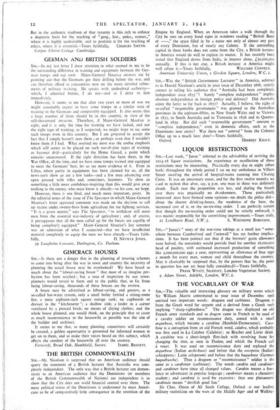GERMAN AND BRITISH SOLDIERS
SIR,âIn my last letter I drew attention to what seemed to me to be the outstanding difference in training and equipment between the Ger- man coops and our own. Major-General Maurice answers me by pointing out that the Germans got their drilling before the war, and can therefore afford to concentrate now on the more detailed refine- ments of military training. He speaks with undoubted authorityâ which, I admitted before, I do notâand so I defer to him immediately.
However, it seems to me that after two years or more of war we might reasonably expect to have some troops in a similar state of training to the Germans and comparably equipped. It also seems that a large number of them should be in this country, in view of the still-threatened invasion. Therefore, if Major-General Maurice is right, and it is only the time for training we have lacked, and not the right type of training, as I suspected, we might hope to see some such troops even in this country. But I am prepared to accept the fact that I simply haven't seen them ; or perhaps even that I wouldn't know them if I had. What .worried me most was the undue emphasis which still seems to be placed on such out-of-date types of training as bayonet drillâparticularly for the Home Guard, a point which remains unanswered. If the right direction has been there, in the War Office, all the time, and we have some troops trained and equipped to meet the Germans' best, let us see more evidence of it. Even in Libya, where parity in equipment has been claimed for us, all the news-reels show us are a few tanksâand a few men advancing over open ground with rifles and, sometimes, bayonets. To show us something a little more confidence-inspiring than this would give away nothing to the enemy, who must know it alreadyâto his cost, we hope.
However, there is one final, and much more important, point. In the editorial notes of the issue of The Spectator in which Major-General Maurice's letter appeared comment was made on the decision to call up topoo under twenty-fives from agriculture for the fighting services. " It is a grave matter," says The Spectator, "to withdraw still more men from the essential war-industry of agriculture ; and, of course, it presupposes that all the men called up for the forces are capable of being completely equipped." Major-General Maurice's last sentence was an admission of what I suspectedâthat we have insufficient material completely to equip the men we have already.âYours faith-


























 Previous page
Previous page